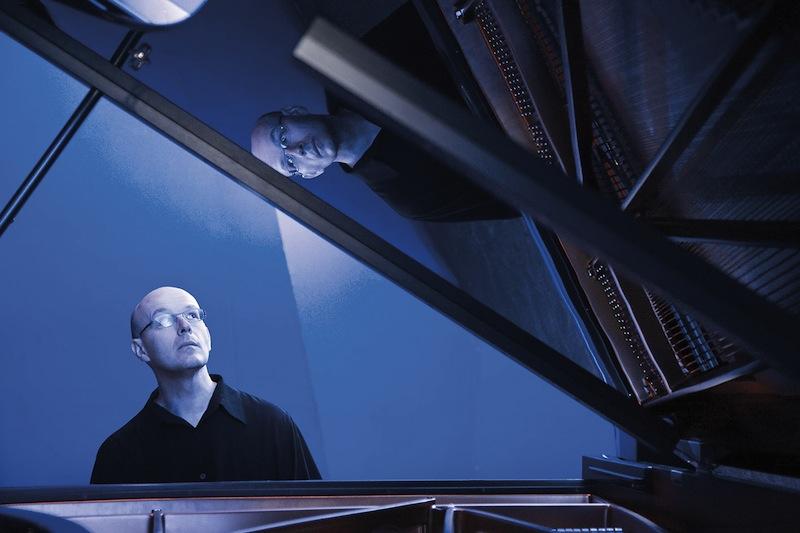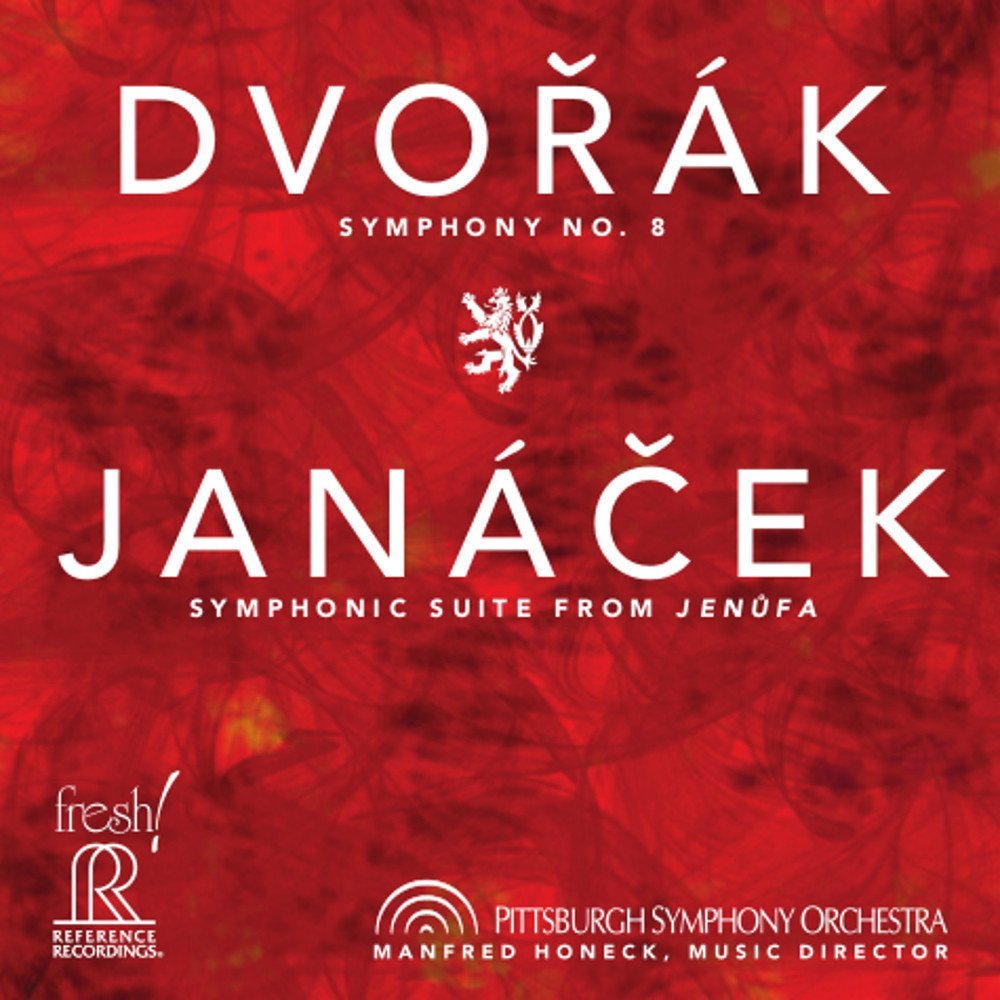Classical CDs Weekly: Dvořák, Haydn, Janáček, Thomas Larcher | reviews, news & interviews
Classical CDs Weekly: Dvořák, Haydn, Janáček, Thomas Larcher
Classical CDs Weekly: Dvořák, Haydn, Janáček, Thomas Larcher
Sizzling Czech orchestral music, witty classical symphonies from a much-missed conductor and contemporary piano music from Austria


Dvořák's Seventh has the Brahmsian drama, and the Ninth has the crowd-pleasing tunes. But the major key Eighth is the most radical, and Manfred Honeck's remarkable performance highlights its originality in some style. Honeck's interventionist approach won't be to all tastes, but he justifies every interpretive decision in his sleeve notes, and the musical results are pretty special. He sees the composer here as ''liberated from Germanic models... completely at home in his native Czech roots”, stressing how close this work is to a programmatic symphonic poem. The solo flute's bird call is unusually flexible, improvisatory. What follows is electrifying – an exuberant adrenalin rush, and a wonderful easing into the rich lower string theme. There's real drama and darkness in the development, and the trumpet reprise of the symphony's opening chorale is magnificent. Listen out for the trilling horns near the close. The Adagio carries a seismic emotional punch – is this the greatest of Dvořák's slow movements? Lightness returns in the Allegretto. Sly string portamenti are audaciously done, and Honeck's treatment of the throwaway coda should elicit gurgles of delight. Trumpets are immaculate at the start of the finale, and Honeck's deliberate pacing of the variation theme allows him to let rip when the music accelerates, aided again by spectacular horns.The folky central section is superbly characterised. Reach the close, and you'll hopefully be awestruck. Cheap thrills and vulgarity are avoided. This is one of the great orchestral recordings – trust me. Playing and production values are beyond criticism.
And there's an intriguing coupling too – an orchestral suite from Janáček's opera Jenůfa, compiled by Honeck with the help of composer Tomáš Ille. Janaček's idiomatic use of folk music emphasises his debt to Dvořák, though the younger composer's startling orchestral technique remains unique. If you're not weeping at the suite's apotheosis, you've got no soul. Buy or download multiple copies for yourself and your loved ones – they will thank you for it.
Not all of Sir Colin Davis's last London Symphony Orchestra recordings were up to the mark – his Nielsen cycle was a particular disappointment. So it's a relief to report that this set of five mature Haydn symphonies, recorded between 2010 and 2011, is a consistent joy. These performances are sharp, affectionate and entertaining. You get shedloads of dry wit. As well as a very vivid sense of Haydn's profundity. Late Mozart symphonies can leave one overawed and feeling humbled. Haydn's music instead conveys a sense of what it's like to be human. Phrases are irregular. Ideas fizzle out. Tempers flare. Jokes get shared. The unpredictability is part of the pleasure. What makes these discs more recommendable is the grandeur of the orchestral sound. The bigger climaxes have sensational impact, though Davis's strings remain brilliantly agile. The Oxford Symphony's Presto is a marvel here – the effervescent main theme surely a model for Prokofiev's Classical Symphony, racing off over a deceptively tricky low horn ostinato. Symphony no 93's Largo cantabile is another highlight, featuring sublime quartet playing. Just in case you think things are getting a little too serious, there's a deliberately disconcerting bassoon blast in the closing bars.
Strange things happen in these pieces. The last movement of no 98 abruptly changes tack in the closing minutes, the texture abruptly thinning to give space for a jaunty continuo solo. Haydn's slow introductions tend to be dark and weighty, making the irrepressible music which invariably follows that much more surprising. There's so much to admire. The Barbican's dryish acoustic really works in Haydn's favour – timpani are nicely in tune and the LSO solo winds excel. A delectable pair of CDs.
Thomas Larcher's ongoing relationship with the piano is traced on this engaging disc. As a developing composer, he associated the piano's sound “with a sense of something worn out, obsolete, at a dead-end...” Wanting to turn the piano into “a different instrument”, he followed Cage's example and prepared the keyboard with rubber wedges and gaffer tape. Larcher's two-movement Smart Dust opens this enjoyable collection. There are moments when you think you're listening to a virtuoso percussion ensemble rather than a pianist, but the music never descends into flashiness. The second section, marked plainly Very fast, is thrilling – intellectually satisfying, amusing and very exciting. After Smart Dust, Larcher returned to the 'conventional' piano, though his 2009 suite What Becomes, written for Leif Ove Ansdnes, does ask for spooky glissandi on the instrument's strings. It's another fiendishly difficult, expressive work, paying homage to Rachmaninov and Mussorgsky while remaining boldly contemporary.
Some of Larcher's twelve Poems make use of ideas sketched while younger; the result is a set of enchanting, quirkily-titled miniatures. Rather like listening to a talented child pianist doodling in the next room. Sad yellow whale is sweet, soft and melancholy, while the rhythmic punch of Frida falls asleep suggests that she's not going to snooze for long. Words can't adequately convey the potency and magic of these little pieces, Larcher's fresh use of tonality avoiding vacuous pastiche. And each one, however slight, is phenomenally played by Tamara Stevanovic, providing beefy thunder as well as calm understatement. There's also a highly accessible song cycle written for tenor Mark Padmore, setting a sequence of oblique contemporary poems by Hans Aschenwald and Alois Hotschnig. Padmore's high register is a thing to marvel at – sample the close of the ninth song. He's beautifully accompanied here by Larcher.
Explore topics
Share this article
The future of Arts Journalism
You can stop theartsdesk.com closing!
We urgently need financing to survive. Our fundraising drive has thus far raised £33,000 but we need to reach £100,000 or we will be forced to close. Please contribute here: https://gofund.me/c3f6033d
And if you can forward this information to anyone who might assist, we’d be grateful.

Subscribe to theartsdesk.com
Thank you for continuing to read our work on theartsdesk.com. For unlimited access to every article in its entirety, including our archive of more than 15,000 pieces, we're asking for £5 per month or £40 per year. We feel it's a very good deal, and hope you do too.
To take a subscription now simply click here.
And if you're looking for that extra gift for a friend or family member, why not treat them to a theartsdesk.com gift subscription?
more Classical music
 Philharmonia, Alsop, RFH / Levit, Abramović, QEH review - misalliance and magical marathon
Kentridge’s film for Shostakovich 10 goes its own way, but a master compels in his 13th hour of Satie
Philharmonia, Alsop, RFH / Levit, Abramović, QEH review - misalliance and magical marathon
Kentridge’s film for Shostakovich 10 goes its own way, but a master compels in his 13th hour of Satie
 Bach St John Passion, Academy of Ancient Music, Cummings, Barbican review - conscience against conformism
In an age of hate-fuelled pile-ons, Bach's gospel tragedy strikes even deeper
Bach St John Passion, Academy of Ancient Music, Cummings, Barbican review - conscience against conformism
In an age of hate-fuelled pile-ons, Bach's gospel tragedy strikes even deeper
 MacMillan St John Passion, Boylan, National Symphony Orchestra & Chorus, Hill, NCH Dublin review - flares around a fine Christ
Young Irish baritone pulls focus in blazing performance of a 21st century classic
MacMillan St John Passion, Boylan, National Symphony Orchestra & Chorus, Hill, NCH Dublin review - flares around a fine Christ
Young Irish baritone pulls focus in blazing performance of a 21st century classic
 Classical CDs: Romance, reforestation and a Rolleiflex
New music for choir, orchestra and string quartet, plus a tribute to a rediscovered photographer
Classical CDs: Romance, reforestation and a Rolleiflex
New music for choir, orchestra and string quartet, plus a tribute to a rediscovered photographer
 First Person: St John's College choral conductor Christopher Gray on recording 'Lament & Liberation'
A showcase for contemporary choral works appropriate to this time
First Person: St John's College choral conductor Christopher Gray on recording 'Lament & Liberation'
A showcase for contemporary choral works appropriate to this time
 Donohoe, RPO, Brabbins, Cadogan Hall review - rarely heard British piano concerto
Welcome chance to hear a Bliss rarity alongside better-known British classics
Donohoe, RPO, Brabbins, Cadogan Hall review - rarely heard British piano concerto
Welcome chance to hear a Bliss rarity alongside better-known British classics
 London Choral Sinfonia, Waldron, Smith Square Hall review - contemporary choral classics alongside an ambitious premiere
An impassioned response to the climate crisis was slightly hamstrung by its text
London Choral Sinfonia, Waldron, Smith Square Hall review - contemporary choral classics alongside an ambitious premiere
An impassioned response to the climate crisis was slightly hamstrung by its text
 Goldberg Variations, Ólafsson, Wigmore Hall review - Bach in the shadow of Beethoven
Late changes, and new dramas, from the Icelandic superstar
Goldberg Variations, Ólafsson, Wigmore Hall review - Bach in the shadow of Beethoven
Late changes, and new dramas, from the Icelandic superstar
 Mahler's Ninth, BBC Philharmonic, Gamzou, Bridgewater Hall, Manchester review - vision and intensity
A composer-conductor interprets the last completed symphony in breathtaking style
Mahler's Ninth, BBC Philharmonic, Gamzou, Bridgewater Hall, Manchester review - vision and intensity
A composer-conductor interprets the last completed symphony in breathtaking style
 St Matthew Passion, Dunedin Consort, Butt, Queen’s Hall, Edinburgh review - life, meaning and depth
Annual Scottish airing is crowned by grounded conducting and Ashley Riches’ Christ
St Matthew Passion, Dunedin Consort, Butt, Queen’s Hall, Edinburgh review - life, meaning and depth
Annual Scottish airing is crowned by grounded conducting and Ashley Riches’ Christ
 St Matthew Passion, Irish Baroque Orchestra, Whelan, St Patrick’s Cathedral, Dublin review - the heights rescaled
Helen Charlston and Nicholas Mulroy join the lineup in the best Bach anywhere
St Matthew Passion, Irish Baroque Orchestra, Whelan, St Patrick’s Cathedral, Dublin review - the heights rescaled
Helen Charlston and Nicholas Mulroy join the lineup in the best Bach anywhere
 Kraggerud, Irish Chamber Orchestra, RIAM Dublin review - stomping, dancing, magical Vivaldi plus
Norwegian violinist and composer gives a perfect programme with vivacious accomplices
Kraggerud, Irish Chamber Orchestra, RIAM Dublin review - stomping, dancing, magical Vivaldi plus
Norwegian violinist and composer gives a perfect programme with vivacious accomplices

Add comment